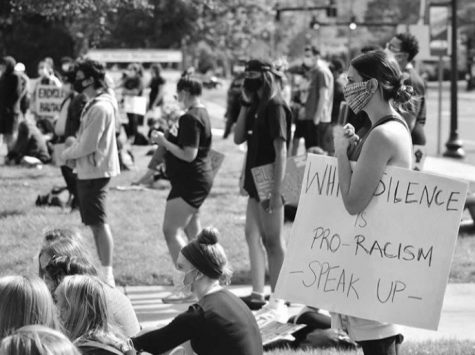Why BLM Isn’t Political and What it Really Means
Before beginning this article, I would like to inform my audience that as a White/Asian mixed woman, in no way do I intend to steal the platform from other POC (people of color) by speaking on the topic of BLM. This is merely an informative piece about a misconceptual saying that I’ve heard all too commonly in the Hall community as well as from influential news sources. This misconception is that the Black Lives Matter movement is ‘political’. This implies that Black lives at the very least mattering is a statement of opinion that comes with a choice whether or not to believe in, when in reality, it’s a self-evident truth. I do not believe the BLM movement was meant to be a political statement; rather, it is a matter of human rights. Black. Lives. Matter. They matter; I don’t see how a political affiliation changes this in one’s mind. Yes, systemic racism is racist policy put into place by lawmakers who must align with some political party, however, no matter where you stand on the political spectrum it should be a universal truth that Black lives (at the very least) matter. America’s current polarized and partisan politics have grossly framed support of the BLM movement into a leftist idea when truly, it was created to stand up for the extraordinarily overlooked rights of Black Americans (as seen time and time again throughout history), as well as to bring awareness to the ever growing number of Black people who are victimized by police brutality.
With the recent new wave of the BLM movement that took place during the Coronavirus lockdown, it’s sometimes easy, particularly for those who hold privilege, (non-POC) to feel a great deal of discomfort around the proposition of relearning principles and acknowledging such privilege. This can include only having learned the ways of grotesque systemic racism recently rather than experiencing it all their lives. However, acknowledging discomfort is the first key step to reforming how one thinks about the movement as a whole, and an individual’s attitude toward society, race, and how their position and upbringings have played into shaping their views. For example, the book, White Fragility, asks readers questions including: “When was the first time you had a teacher of the same race as yours? Were the honors or advanced placement classes and the lower-track classes equally racially integrated? If not, why not? If people of color did not live in your neighborhood, why didn’t they? Where did they live?” Socialization is the process during childhood by which individuals acquire the values, habits, anda attitudes of a society. It’s important to be aware of how your own socialization affects the ideas you perpetrate now.
As previously mentioned, discomfort often leads to dissociation, which is a possible reason people use excuses like, ‘I’m not really into politics’ when asked about their stance on BLM. What this really says whether intended or not is, ‘I haven’t been paying enough attention or reeducating myself on issues of racism and human rights’, again, the privilege shows, as POC and those who are targeted by the system have no option to ignore the issue. Additionally, even if one is not into so-called ‘politics’, if they aren’t standing up to it, they’re condoning it. If you’re not standing up to racism or educating others, that in itself is racist. As author Ibram X. Kendi states in his book, How To Be an Antiracist, “The opposite of racist isn’t not racist. It is anti-racist…There is no in-between safe space of not racist.’” Additionally, being antiracist or racist is not entirely a fixed identity, rather, it depends on a decision by decision basis. Therefore, the next time somebody asks you how you feel about the BLM movement, or the next time that a classmate says something racist, even just a microaggression, choose whether you will stand up and be anti racist, or let it slide and be racist.

